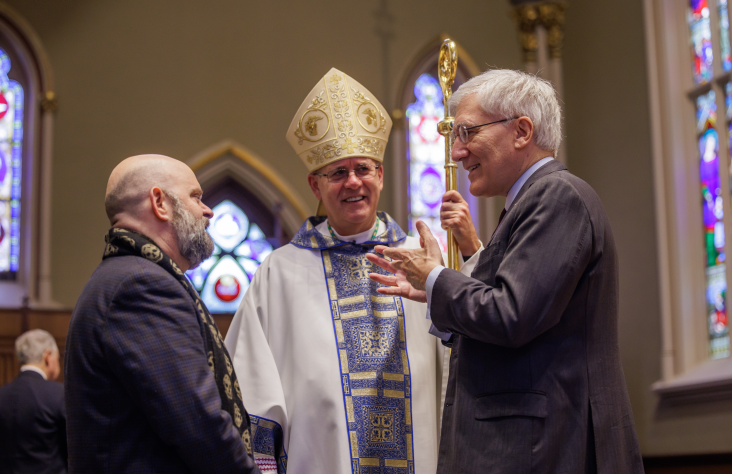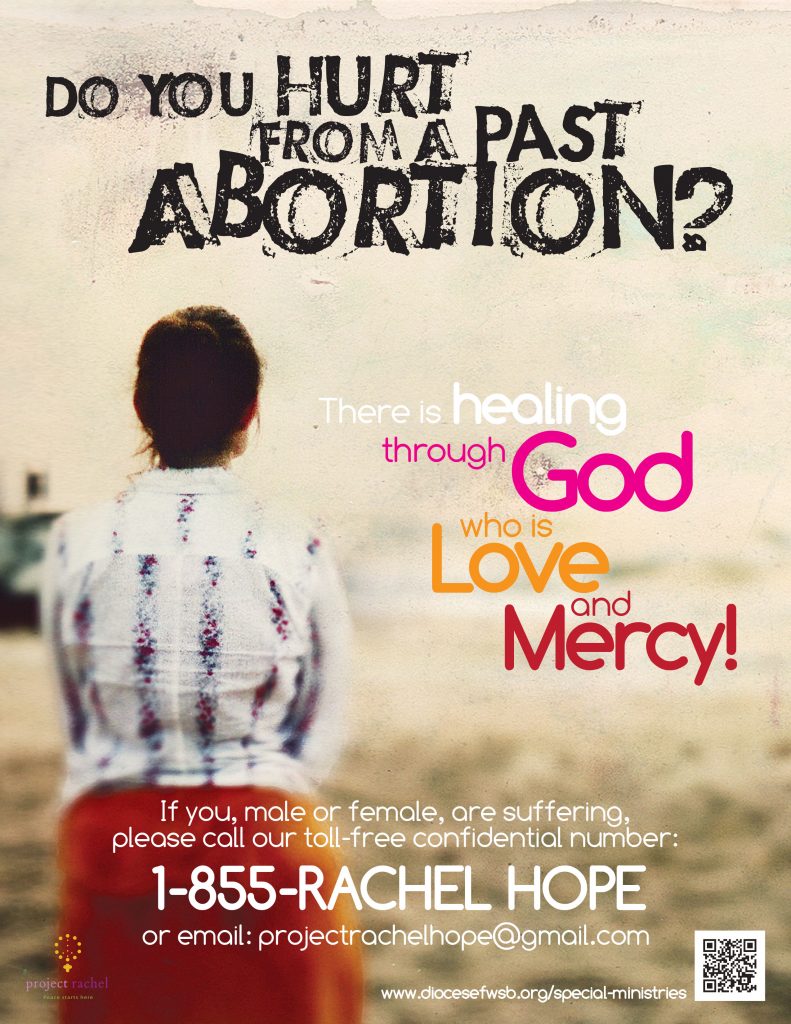October 1, 2019 // Diocese
Hope and healing after abortion
The gruesome discovery of 2,246 medically preserved fetal remains on the property of Ulrich Klopfer has been upsetting on so many levels, and it stands to reason that this revelation may be especially traumatic for women and men who sought abortions from Klopfer during the decades that he performed them at his clinics in Fort Wayne and South Bend.
The Diocese of Fort Wayne-South Bend stands ready to help anyone in the area to process the loss of his or her baby through our post-abortion healing ministry, Project Rachel.
Project Rachel consists of a compassionate, confidential network of specially trained priests, professional counselors and lay companions who provide an integrated array of services, including pastoral counseling, support groups, retreats, referrals to licensed mental health professionals and the opportunity to receive the sacrament of reconciliation. This program is now offered in 140 Catholic dioceses in the United States, as well as dioceses in other countries. It is open to people of any faith or no faith.
Vicki Thorn, who founded Project Rachel in 1984 and currently serves as the director of the National Office of Post-Abortion Reconciliation and Healing, said that while some women report relatively little trauma following abortion, for many, abortion is devastating. It causes serious and persistent emotional, psychological and spiritual difficulties. Women who have experienced an abortion may exhibit some or several of the following symptoms:
• Low self-esteem
• Grief, ranging from mild to profound
• Depression, sometimes to the point of suicidal thoughts and attempts
• A sense of alienation from family and friends
• A feeling of being ‘numb,’ not able to enjoy activities that used to be pleasurable
• Difficulty concentrating
• Isolating oneself from others to avoid discussing the abortion experience
• Guilt and shame
• Anger towards oneself, the baby’s father, or others involved in the abortion
• Alcohol and drug problems, which develop to dull the pain
The British Journal of Psychiatry published an article in 2011 that examined data extracted from 22 studies. The article, “Abortion and mental health: quantitative synthesis and analysis of research published 1995−2009,” concluded that “the results of this meta-analytic review of the abortion and mental health literature indicate quite consistently that abortion is associated with moderate to highly increased risks of psychological problems subsequent to the procedure… Overall, the results revealed that women who had undergone an abortion experienced an 81% increased risk of mental health problems.”
Some women experience emotional and psychological symptoms soon after the abortion. However, it is more common for symptoms to occur over the course of five to 12 years after the abortion. Sometimes a woman does not realize that the suffering she has been experiencing, perhaps for many years, is associated with her past abortion.
Those who experience symptoms of grief and mourning after an abortion are often dismissed with the advice to “get over it” and left alone to suffer in silence, sometimes for decades, before seeking help and healing. Men experience aftermath from abortion as well.
According to Vincent Rue, Ph.D., co-director of the Institute for Pregnancy Loss in Jacksonville, Florida, a psychotherapist, researcher and author, “Men do grieve following abortion, but they are more likely to deny their grief or internalize their feelings of loss rather than openly express them …. Because of this, men’s requests for help may often go unrecognized and unheeded by those around them.”
Project Rachel exists to extend the mercy of God to women and men who have experienced abortion. As Thorn said when she came to the Diocese of Fort Wayne-South Bend in 2008: “No one has ever called me and said that healing didn’t happen if they opened their heart to [God]. If fact, women often give me a hug and whisper, ‘Thank you’ in my ear.
“I recently met a woman whom I had counseled. With a huge smile she said, ‘You and I have known each other a long time!’ And the joy in her eyes told me that the merciful hand of God had touched her and made her whole.”
For more information about the local Project Rachel program, visit www.rachelhopes.org, call 1-855-RACHEL HOPE or email [email protected].
In addition, the diocese will hold two memorial Masses in October for those who have lost a child before or after birth, including through miscarriage and abortion. The first memorial Mass will take place Thursday evening, Oct. 10 at 7 p.m. at St. Thérèse, Little Flower Church, South Bend. The second will be celebrated Tuesday evening, Oct. 29 at St. John the Baptist Church, Fort Wayne. Those who attend the memorial Masses will have an opportunity to record their child’s name in a book of remembrance, to entrust their little one to God and to take home a silk rose in honor of him or her. All are welcome.
For more information contact Lisa Everett at [email protected] or call 574-234-0687.
The best news. Delivered to your inbox.
Subscribe to our mailing list today.







